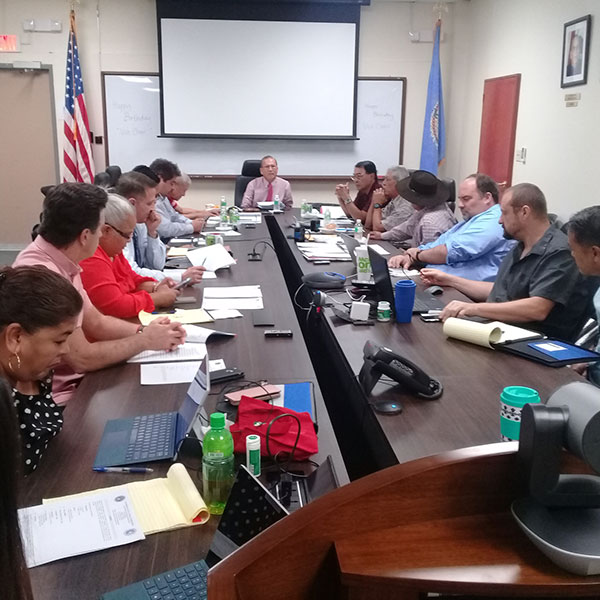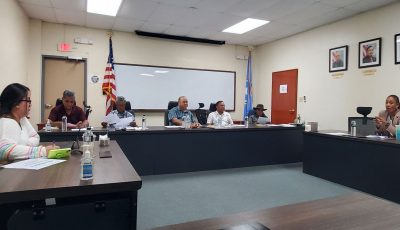CCC rejects IPI proposal

Commonwealth Casino Commission chair Juan M. Sablan presides over a special meeting yesterday. (Ferdie de la Torre)
The Commonwealth Casino Commission’s five members unanimously rejected yesterday Imperial Pacific International (CNMI) LLC’s proposal for CCC to agree to what essentially is another preliminary injunction that will give IPI 120 days to seek an amendment of the law to resolve their legal dispute.
CCC chair Juan M. Sablan said in an interview that they rejected IPI’s proposal because it is already an ongoing court case and that the issue also involves public interest.
“We’ve got a public outcry too [as] to why we delay the process,” said Sablan, adding that both parties have valid concerns and that it is up to Superior Court Associate Judge Kenneth L. Govendo to decide on the issue.
After holding an executive session where they discussed IPI’s proposal, Sablan, vice chair Joseph C. Reyes, treasurer Alvaro A. Santos, secretary Ramon Muna Dela Cruz, and Public Affairs & Media Relations Diego Maratita Songao came out in public session. The five commissioners then voted to reject IPI’s proposal.
In an interview, acting CCC executive director Charlie O. Atalig said the commissioners voted to reject IPI’s offer and to essentially wait for Govendo’s decision on the case today, Friday.
“I guess we’ll see how we will move forward from there,” Atalig said.
IPI is trying to block the release of financial information that it claims are confidential. The CCC has already signaled its intention to release the information. To prevent that, IPI sued the CCC.
To resolve the dispute, Atalig said, CCC made an offer to IPI for IPI to essentially withdraw the lawsuit and work on having the law amended.
IPI’s counter-offer was to be given 120 days to work on having the law amended, Atalig said. That was the counter-offer that the CCC rejected.
“We are just following the law,” he said.
Before the executive session, Sablan asked the parties’ counsels to explain the status of the case as he noted that there is a request from IPI to basically delay the process for 120 days.
Assistant attorney general Michael Ernest, who is the internal legal counsel for CCC, said his discussion should be done in an executive session because the case is pending in court.
IPI counsel Viola Alepuyo explained that their counter-offer to CCC was to save on litigation costs. Matthew Gregory, counsel for IPI’s two subsidiaries—Grand Marianas and Imperial Pacific Properties—also discussed their position.
IPI is suing CCC to prohibit the commission from releasing information in their audited financial reports that they believe is confidential.
Govendo issued a temporary restraining order against CCC and conducted a three-day hearing on IPI’s motion for preliminary injunction. After completing the hearing last Thursday, Govendo placed the matter under advisement.
Govendo, however, encouraged the parties to sit down and resolve the matter, considering that IPI’s tax information is no longer the only issue being argued, but other information included in IPI’s audited financial statements that was not divulged in court.
Govendo said if the parties will not end in a compromise, the court will issue an order today, Friday.
In an interview yesterday before CCC rejected IPI’s counter-offer, Alepuyo said they’re saying there is very little information that should be redacted from IPI’s financial statement. Alepuyo said all financial statements from 2015 all the way to 2018 are already with CCC.
Alepuyo said that even if Govendo comes up with a decision, if it is against the government, more than likely they will appeal and, if it is against IPI because it is a constitutional provision, more than likely IPI will appeal.
“This is not just confidential information about IPI. This confidential information is about any other companies in the CNMI,” Alepuyo said.
Alepuyo said CCC’s offer, which was discussed on record, was that IPI would withdraw their petition for TRO and then IPI would go to the Legislature for a fix.
“Our concern was, as soon as we withdraw the TRO, our confidential information is no longer confidential. We cannot drop that part of our argument,” she pointed out.
Alepuyo said instead of agreeing to withdraw IPI’s petition, they made a counter-offer for CCC to agree for the court to issue a preliminary injunction.
“Just to make a status quo while we go to the Legislature, giving us 120 days to have the law amended,” she said.
Citing an example, Alepuyo said if the judge can come up with a decision and it only addresses half of the concerns in the case, it does not necessarily mean that the party cannot appeal it and it goes back to the trial court and they will start all over again.
“We want to avoid hundreds of thousands of dollars in litigation costs to the CNMI government, to the CCC,” Alepuyo said.
As to the question if the Legislature can fix the apparent ambiguity of the law within 120 days, Alepuyo said they have spoken directly to the House speaker, Senate president, and acting governor, where they explained their position as to why they fought to be keep the information confidential.
“Because of the Constitution. Because of the tax laws. Because of Open Government Act laws. Because all of these are confidential information that need to be protected,” she said.
Alepuyo said what they want to amend is Public Law 19-24.
Public Law 19-24 seeks to clarify the powers of the CCC and to make needed changes to the Commonwealth Code, given its unique regulatory oversight of the casino industry in the Commonwealth.
Gregory, in an interview, said the information of the two IPI subsidiaries that he represents is also some of the redacted information—financial information, tax information, confidential information, that they’re seeking to protect.
“We are not a licensee, so there is no reason to disclose our information at all to the public,” Gregory said. “We are not even a licensee. Why are they disclosing our information?”
He said Govendo has already given them more than 20 days of the TRO.
“We keep the information confidential until the court makes a decision,” he said.



























